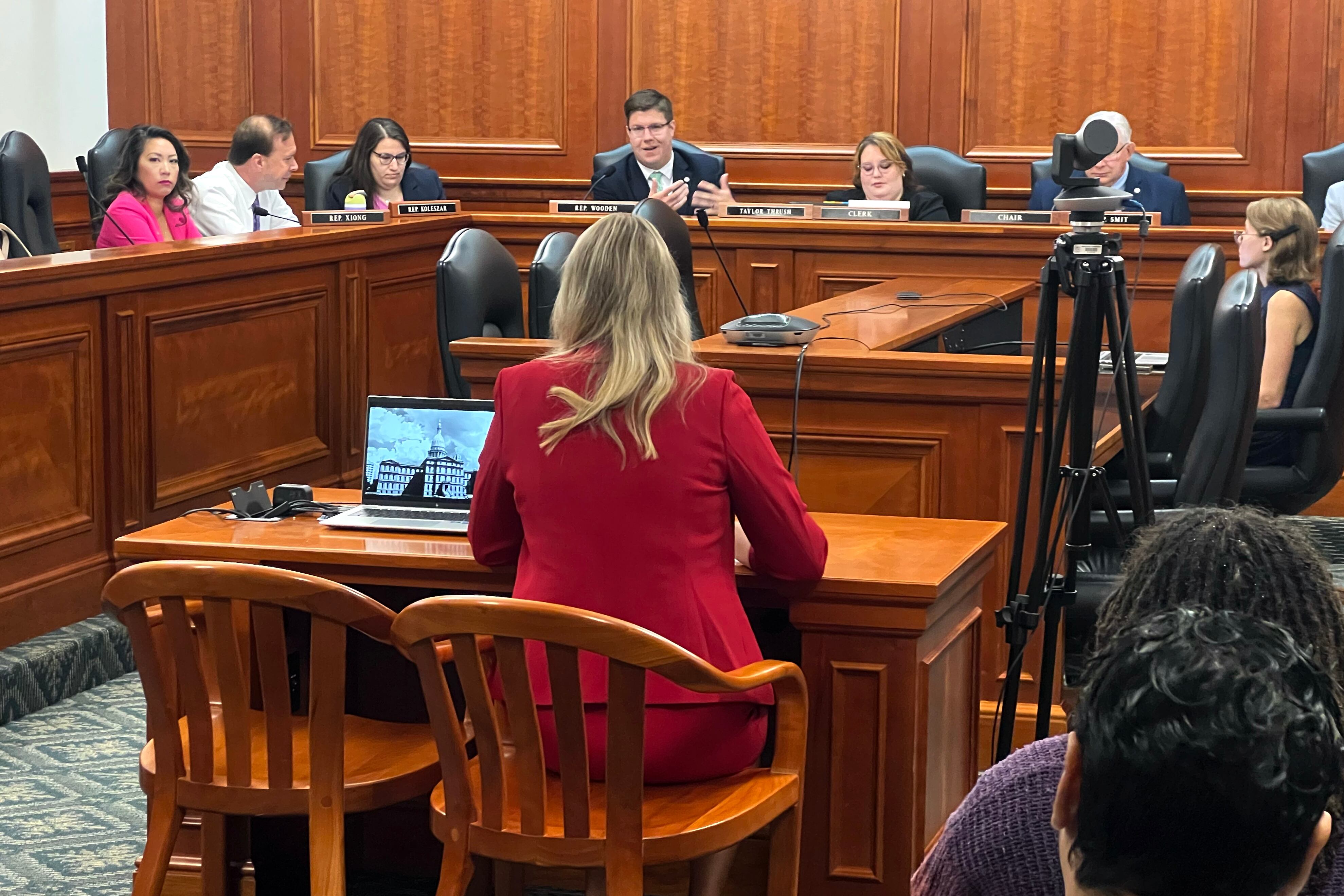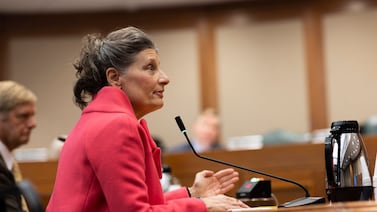Votebeat is a nonprofit news organization reporting on voting access and election administration across the U.S. Sign up for Votebeat Michigan’s free newsletter here.
LANSING — Just as efforts to add ranked choice voting to the Michigan Constitution are ramping up, Republican lawmakers in the House are interested in banning the controversial form of voting.
Rep. Rachelle Smit, a Republican from Martin and chair of the House Election Integrity Committee, introduced House Bill 4707 last month. It would ban any communities across the state from using ranked choice voting and would prevent cities from enacting new ordinances to use it.
Smit said the bill would prevent yet another burden on clerks who have already had to adjust to the significant expansions in election law in 2018 and 2022.
“In my district, in the last several months we’ve been talking about this topic, and I have not heard of one clerk, local or county, that is supportive of it,” Smit said Tuesday during a committee hearing on the bill.
The committee voted 6-3 along party lines to pass the bill to the full House. The House meets Tuesday afternoon.
The bill, if enacted, would make Michigan the 18th state to ban ranked choice voting. But it has a long way to go before that. It must first go through the Republican-controlled House, where it is likely to find support, and the Democratic-controlled Senate, where it is less likely to succeed, particularly as budget negotiations dominate lawmakers’ attention.
How ranked choice voting would work
Ranked choice voting has been a focus of legislators in both parties since a group called Rank MI Vote announced its campaign to get a ranked choice voting proposal on the ballot in 2026. The group has been gathering signatures on petitions for more than a month now, and organizers will need signatures from nearly 450,000 registered voters across the state to get the proposed constitutional amendment on the ballot.
Rank MI Vote Executive Director Pat Zabawa said in a statement to Votebeat that his team “remains laser-focused” on collecting signatures and “letting Michigan voters decide this issue for themselves next November.” The group has set a goal of getting at least 611,000 signatures, allowing a buffer over the minimum required.
If voters approve the measure, it would mark a major shift in Michigan elections. Instead of picking just one candidate, voters would rank them by preference. If no candidate wins an outright majority of first-choice votes, the last-place finisher would be eliminated and that candidate’s votes would be redistributed to other candidates based on the voters’ rankings. The process repeats until only two candidates remain, and the one with the most votes wins.
The method is already used in Maine and Alaska, as well as New York City, San Francisco, and other cities. If Michigan adopted ranked choice voting, it would be the most populous jurisdiction in the country to use it. But a June poll found that 65% of Michigan voters would oppose ranked choice voting.
Several communities in Michigan have used ranked choice voting before — it was required in Eastpointe, for instance, after the U.S. Department of Justice sued the city for violating the Voting Rights Act through “racially polarized voting patterns.” Others, including Ann Arbor, Royal Oak, and Kalamazoo, have approved it for use, although none use it in part because of Michigan’s home rule requirements.
Smit’s bill would invalidate those approvals and make it impossible for other communities to approve similar measures in the future. It would not, however, override a potential constitutional amendment: If the Rank MI Vote effort is successful in getting its proposal on the ballot and approved by voters, it would make HB 4707 unenforceable even if it was ultimately signed into law.
Some lawmakers pressed Smit on that issue during Tuesday’s hearing.
“Because there might be a ballot initiative that gets on the ballot if they get the signatures, wouldn’t it be easier just to respect the role of Michigan voters and let them decide?” asked Rep. Matt Koleszar, a Democrat from Plymouth.
Smit said it was her job as chair to be proactive on election legislation and try to put parameters in place. “I’m hearing loud and clear in my district that this is not something that locals and clerks particularly would like,” she said.
Smit told Votebeat that she would encourage voters to not sign any petitions for ranked choice voting.
Is ranked choice more collaborative or just more complex?
Others also testified on the bill Tuesday, including a local election official and activists on both sides of the issue. Joe Spaulding, campaign director for Rank MI Vote, defended ranked choice voting as a more representative approach. “HB 4707 effectively means that with four candidates in a race, the winner only needs 25% of the voters to win,” Spaulding said. “Ranked choice voting incentivizes collaboration instead of partisan hatred, while single-choice elections without ranking makes negativity inevitable.”
He said that the error rate for ranked choice voting is “roughly the same” as in single-choice elections, targeting an argument that ranked voting is significantly harder for voters.
Jason Snead, executive director of the Honest Elections Project and a strong opponent of ranked choice voting, testified remotely in favor of Smit’s bill. Ranked choice voting makes things more complex, he said, calling it a “solution in search of a problem.”
“I think one important point to note for legislators is that it is an extremely expensive proposition as well, because you have to educate the public,” Snead said. “New York City, when they used this system for the first time, spent $15 million on a program to re-educate people on how to vote with rank choice voting.”
Correction, Aug. 20: A previous version of this story incorrectly attributed a statement during the hearing to state Rep. Stephen Wooden. The statement was made by Rep. Matt Koleszar.
Hayley Harding is a reporter for Votebeat based in Michigan. Contact Hayley at hharding@votebeat.org.




